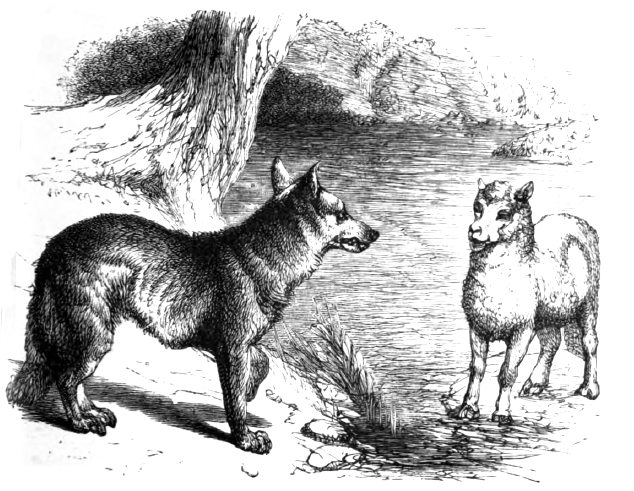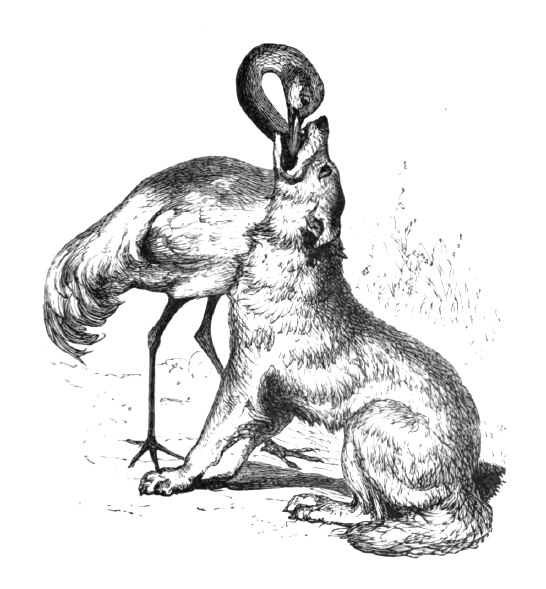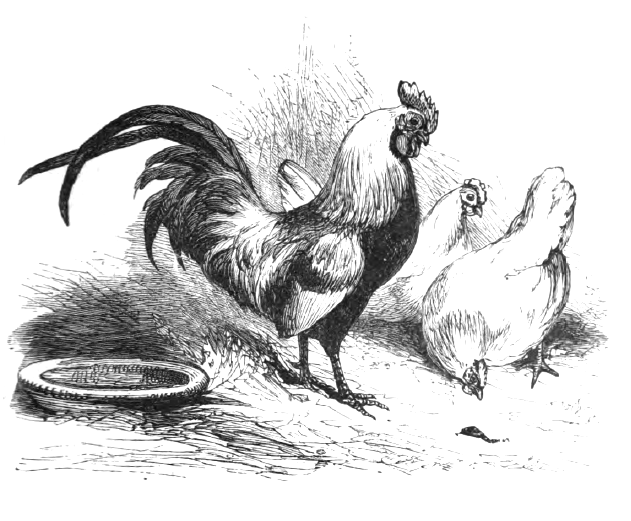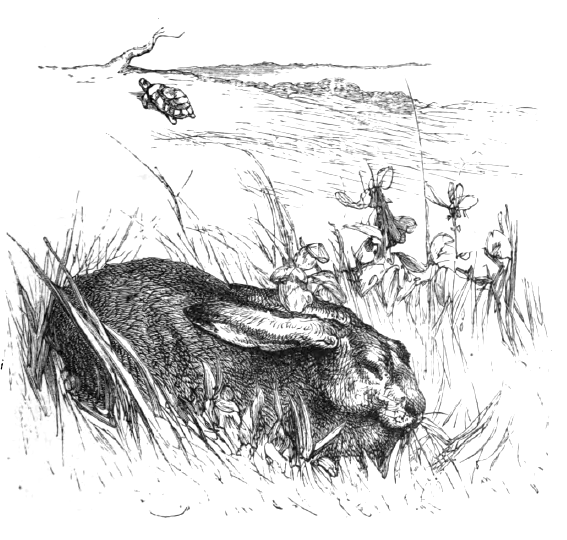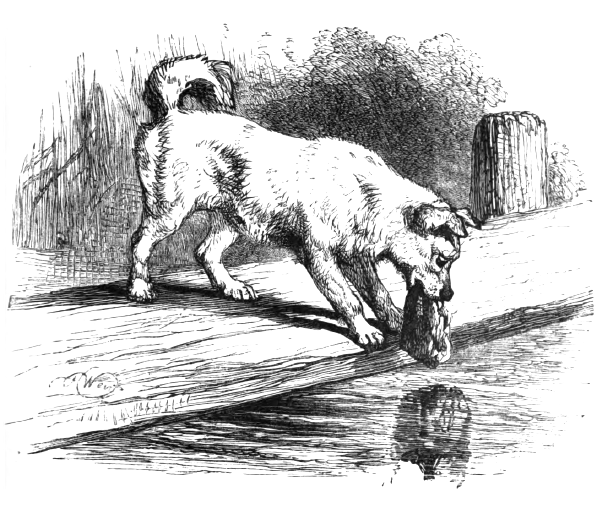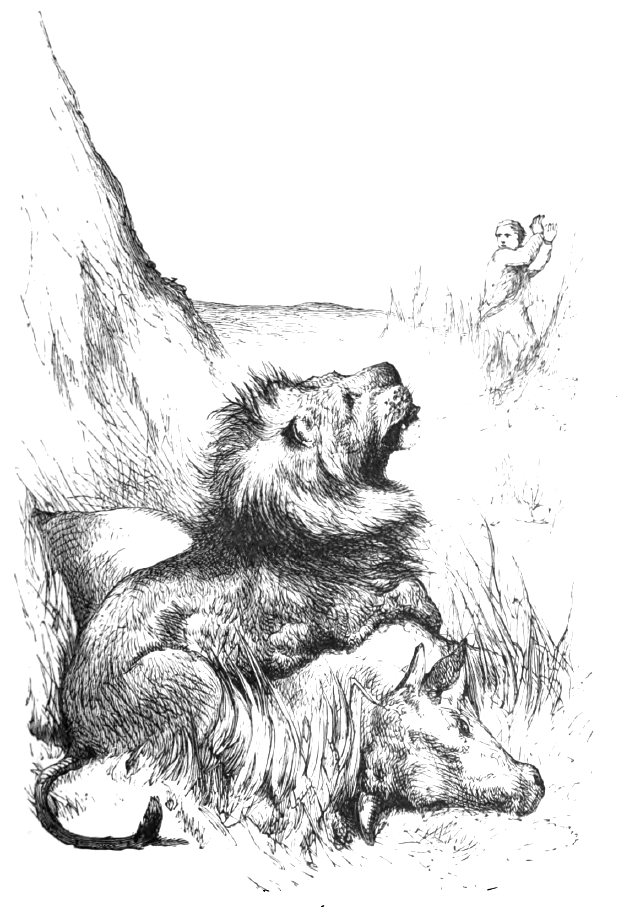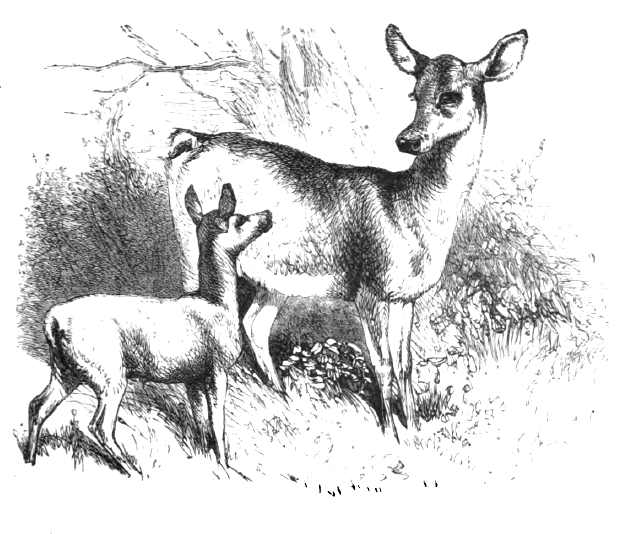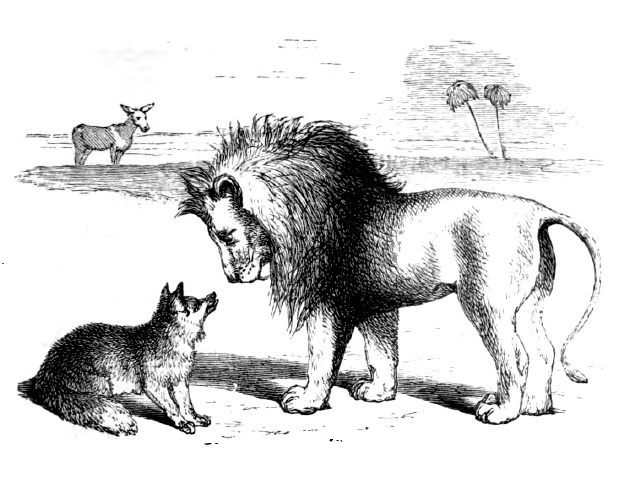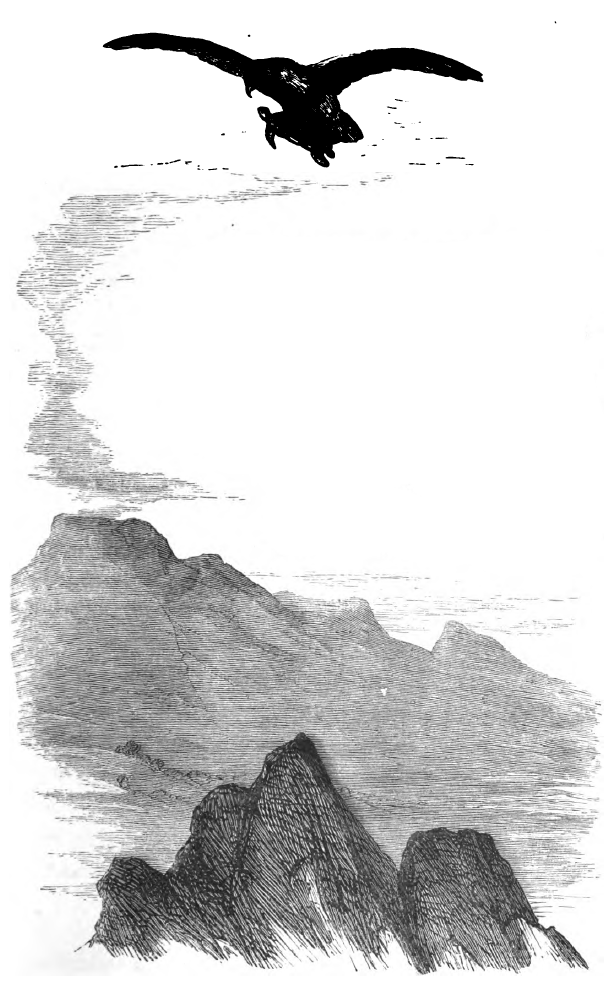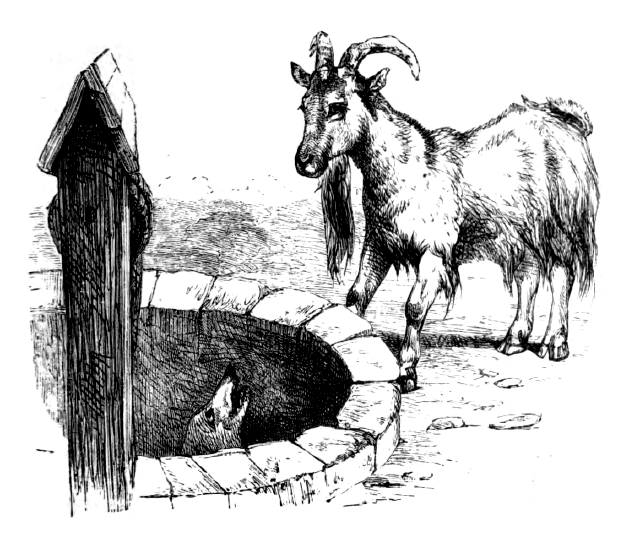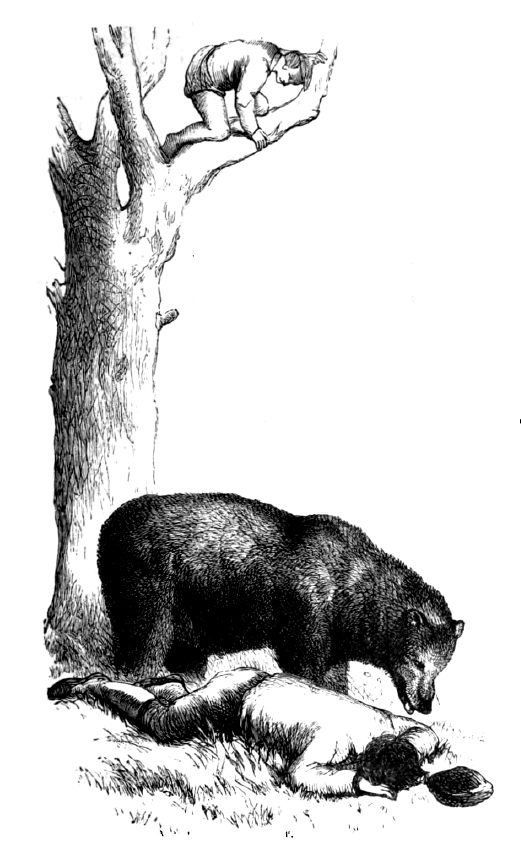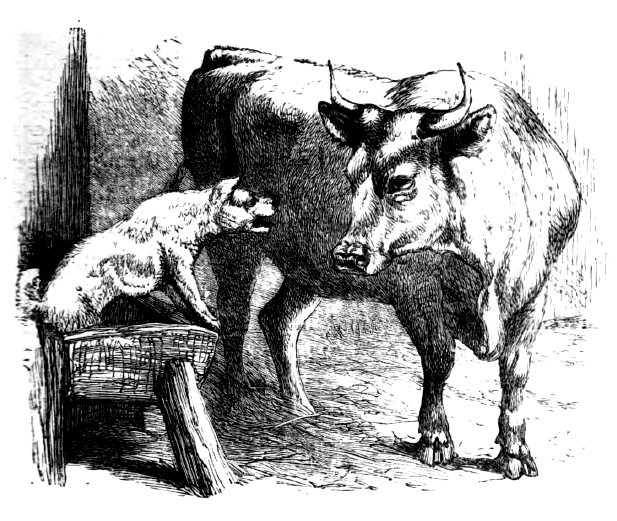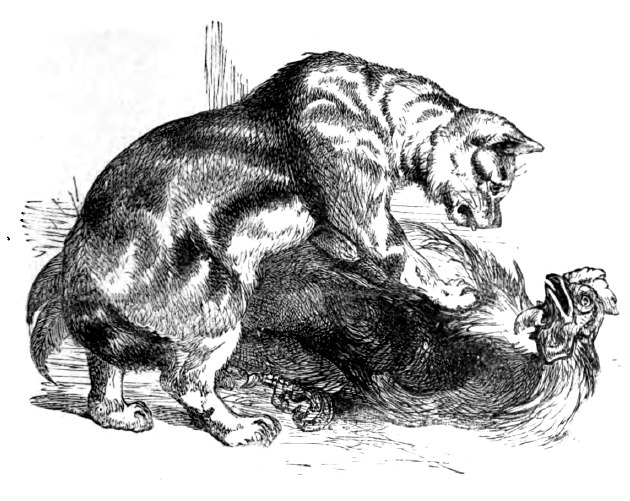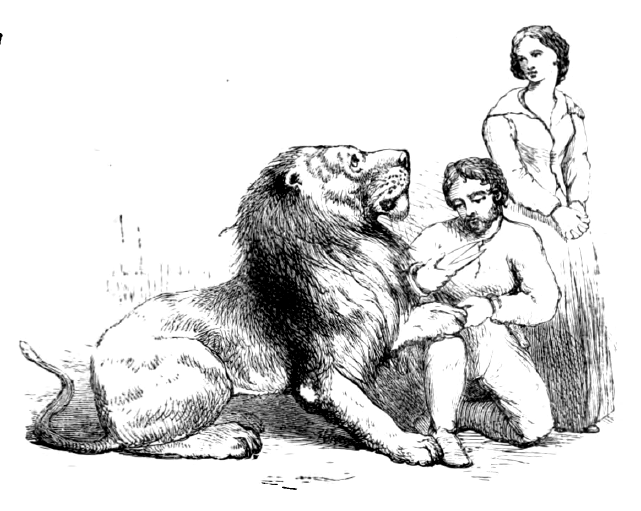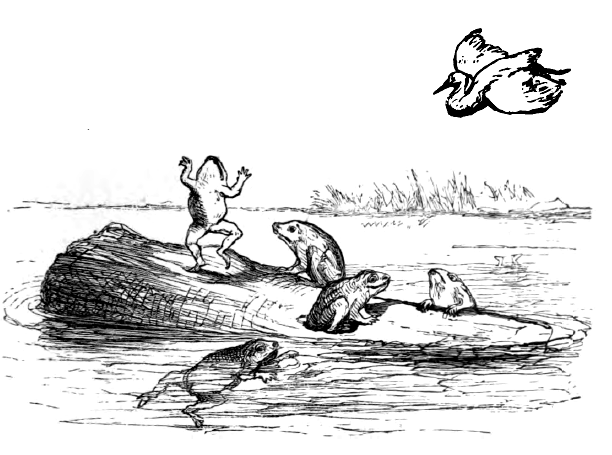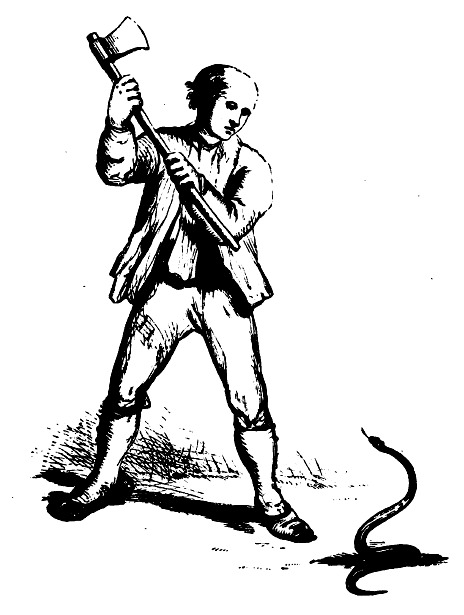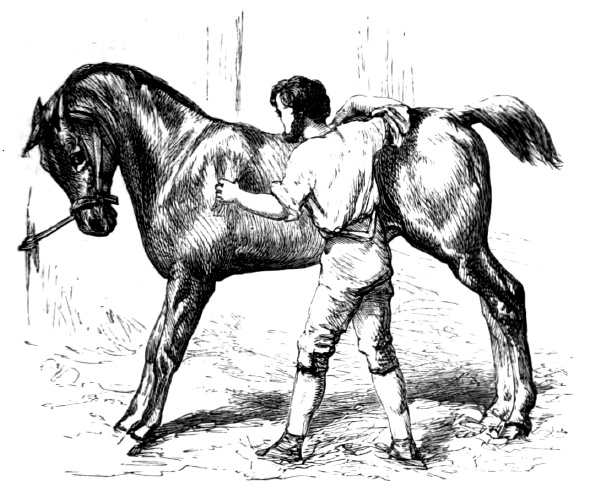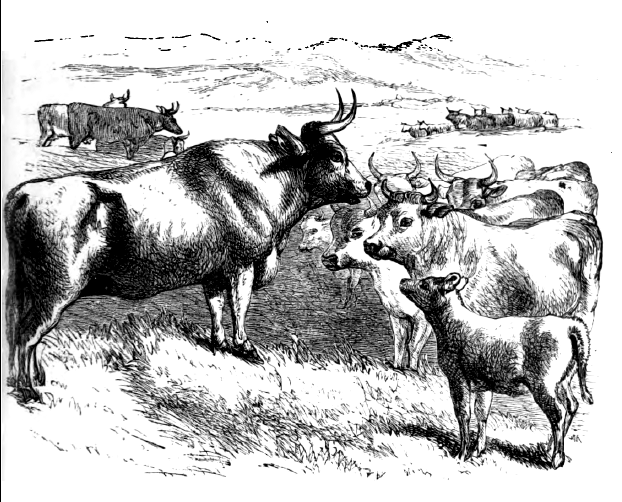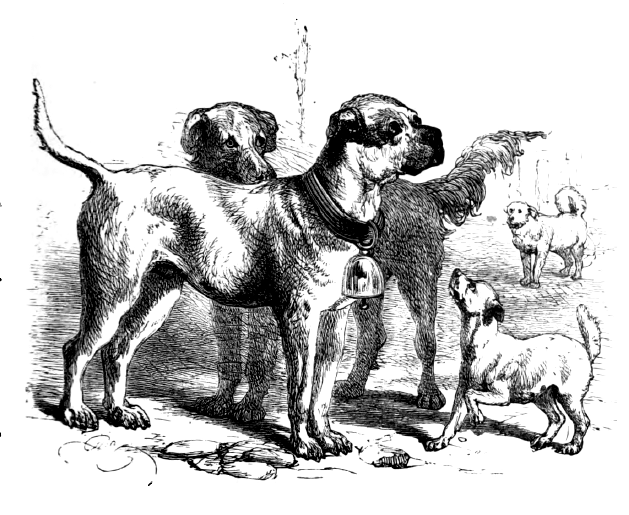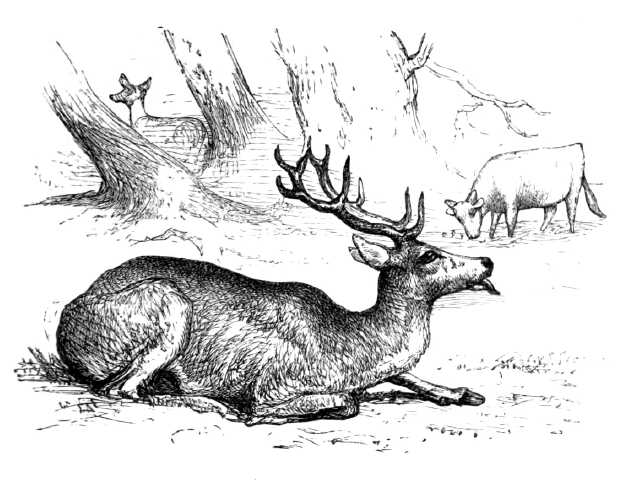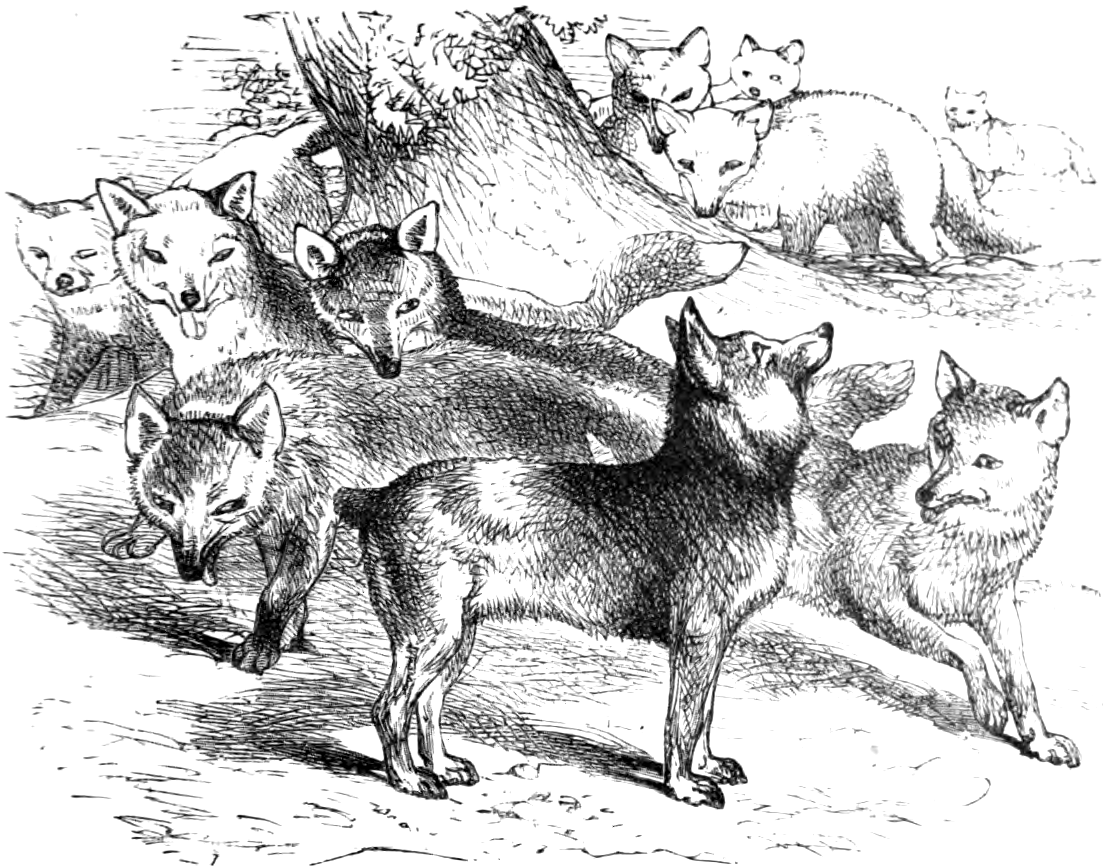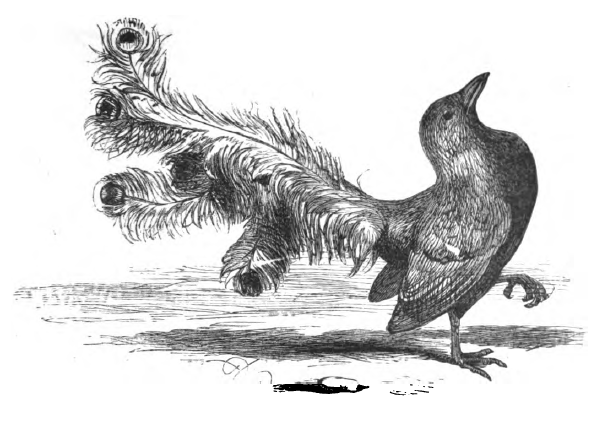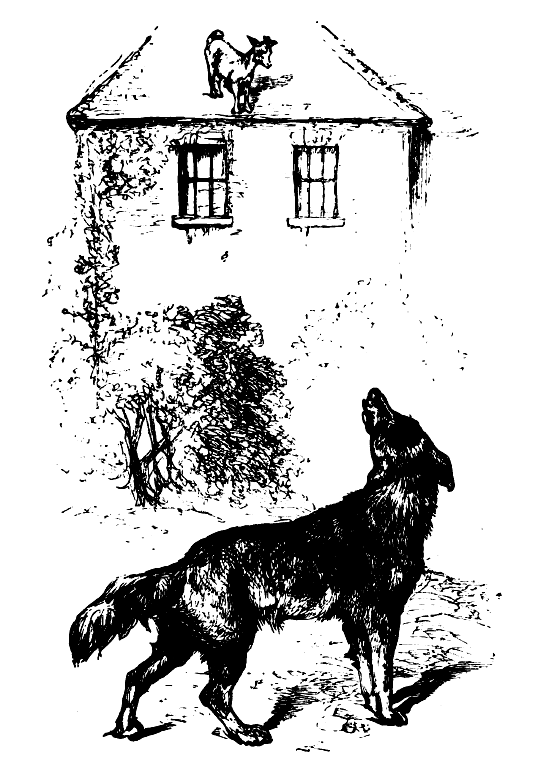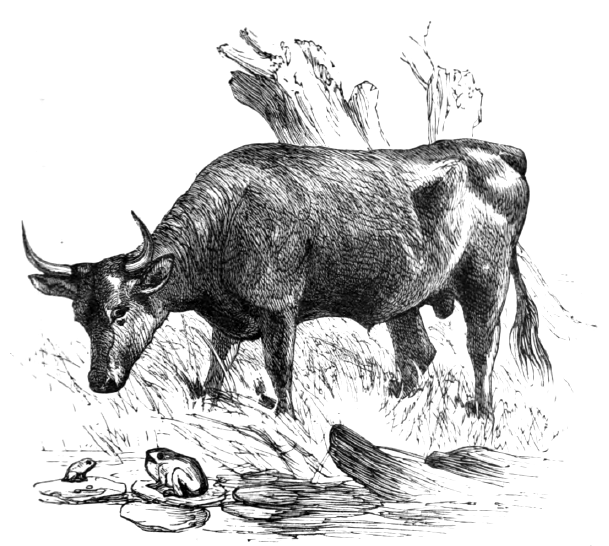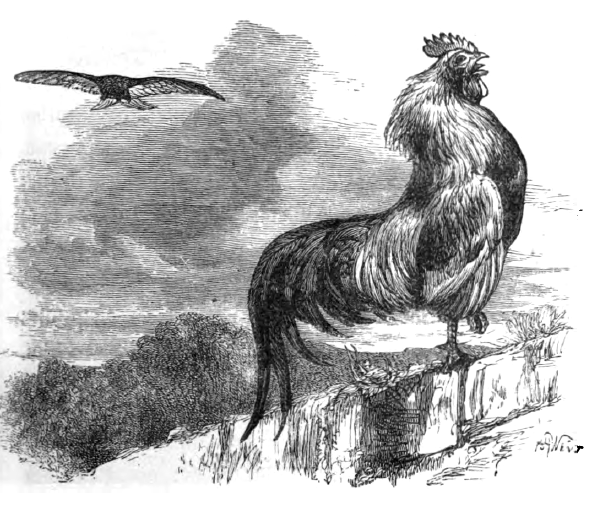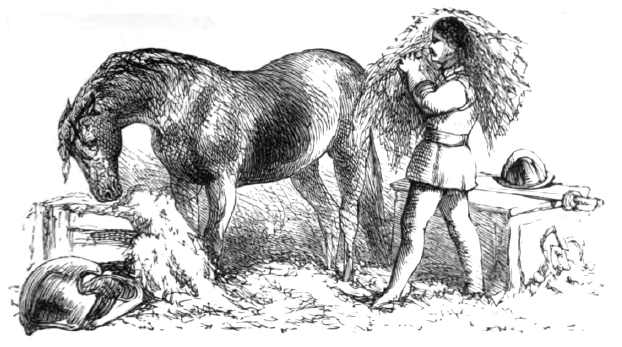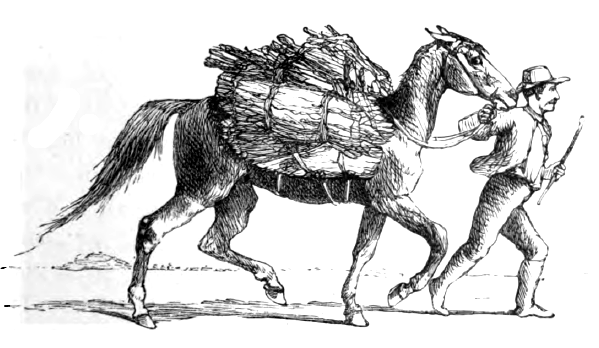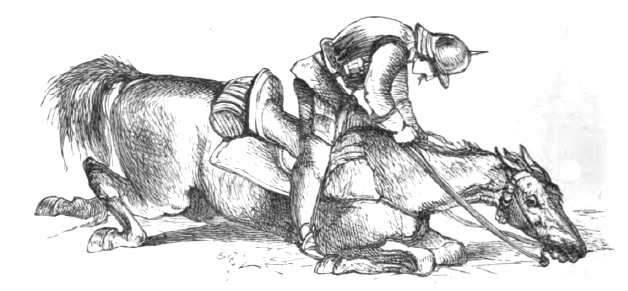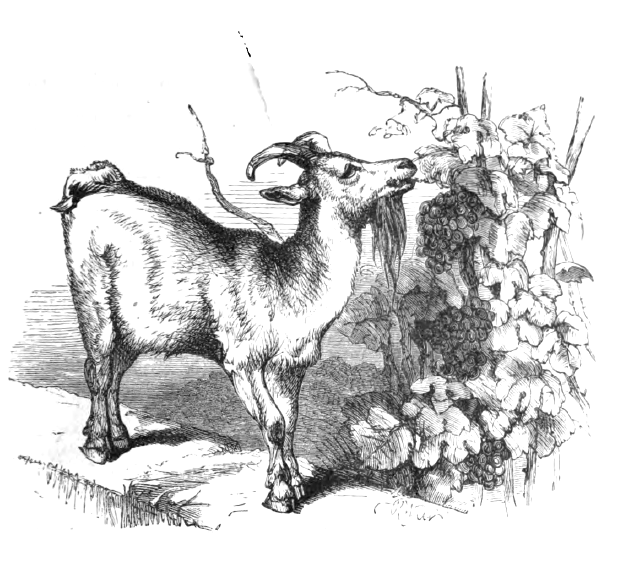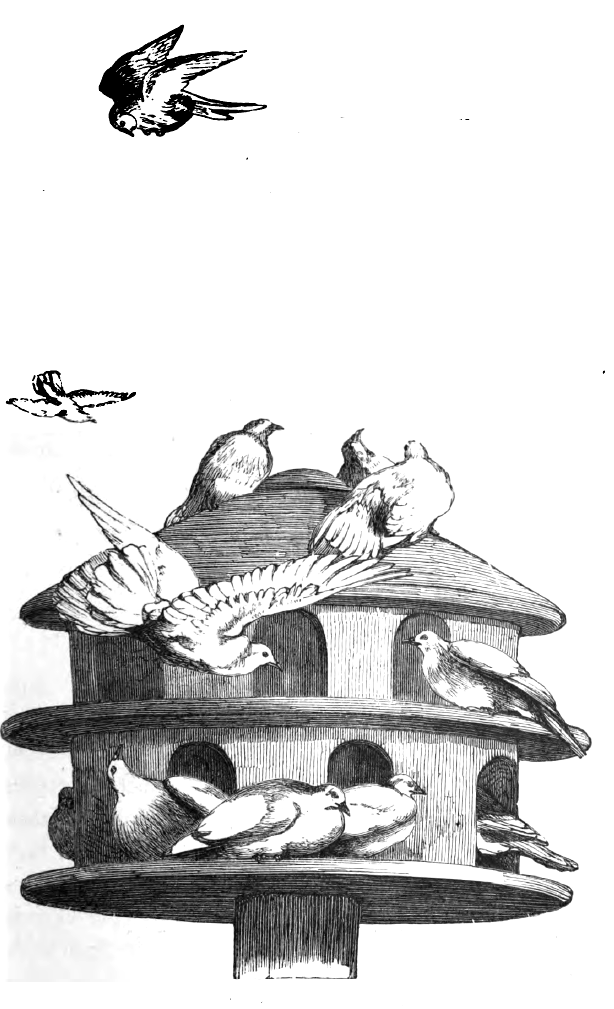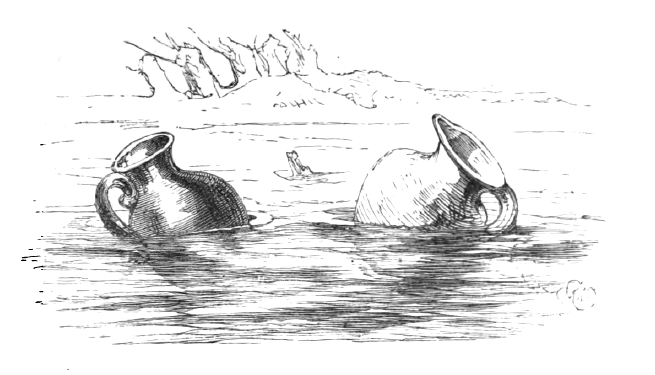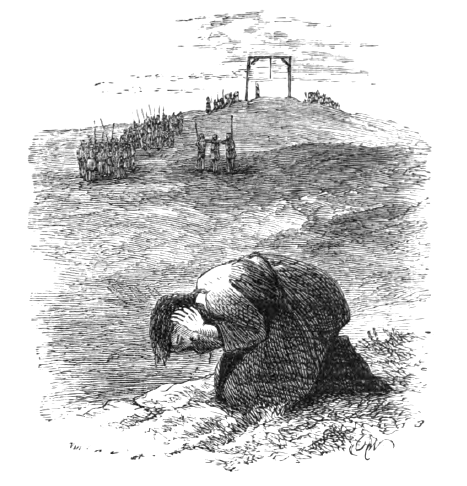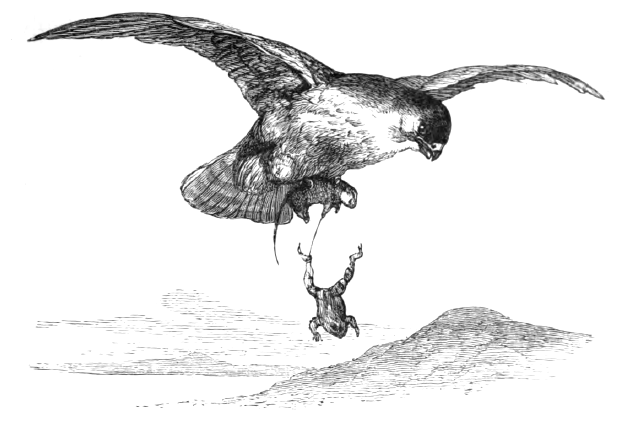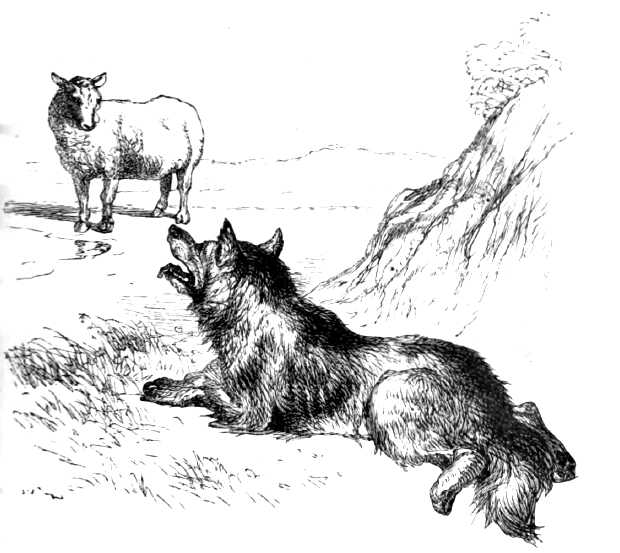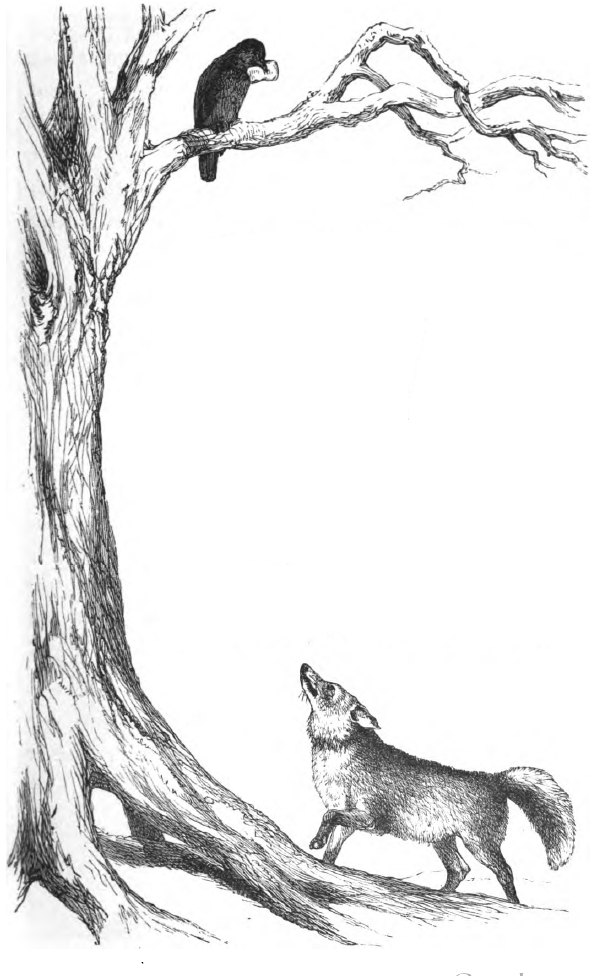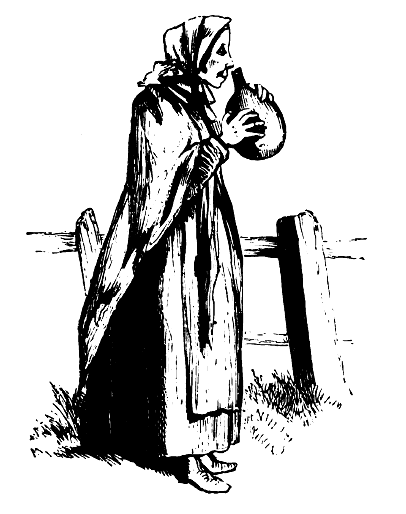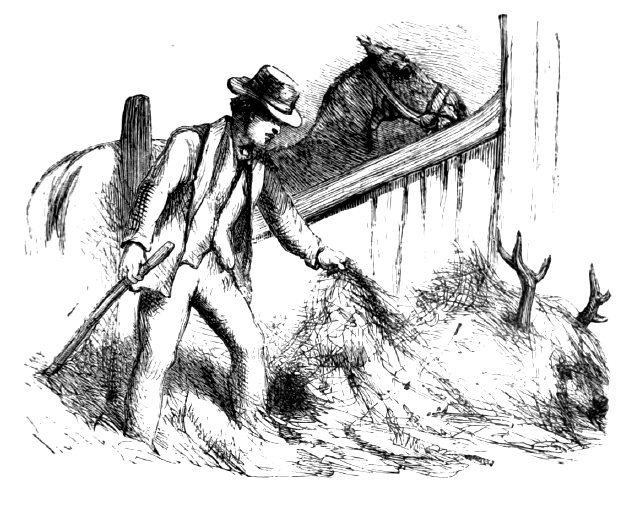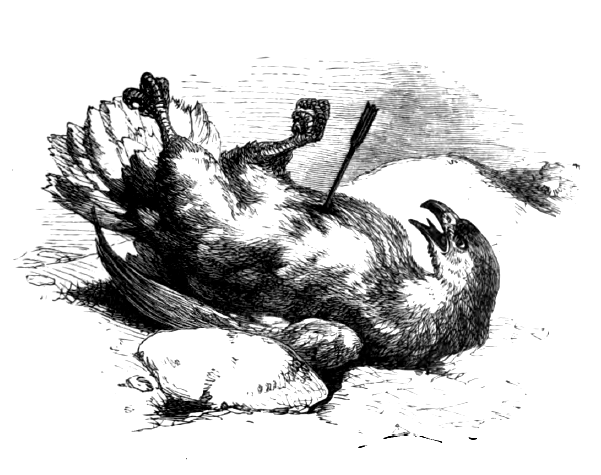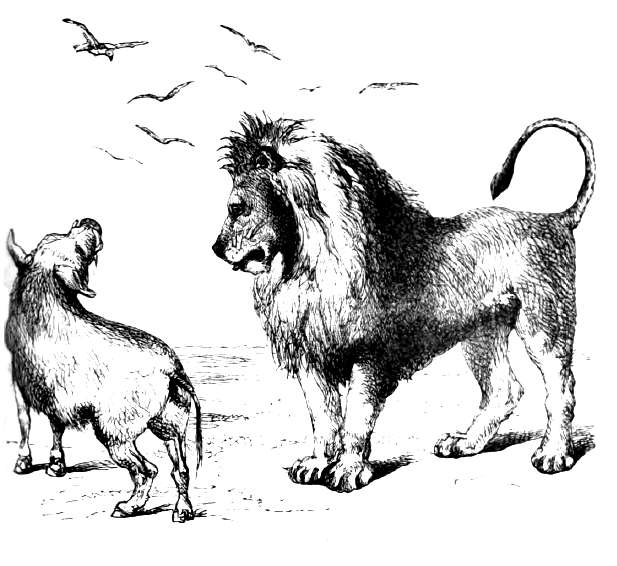| Web
and Book design,
Copyright, Kellscraft Studio 1999-2016 (Return to Web Text-ures) |
 (HOME)
|
THE
FABLES OF ÆSOP.
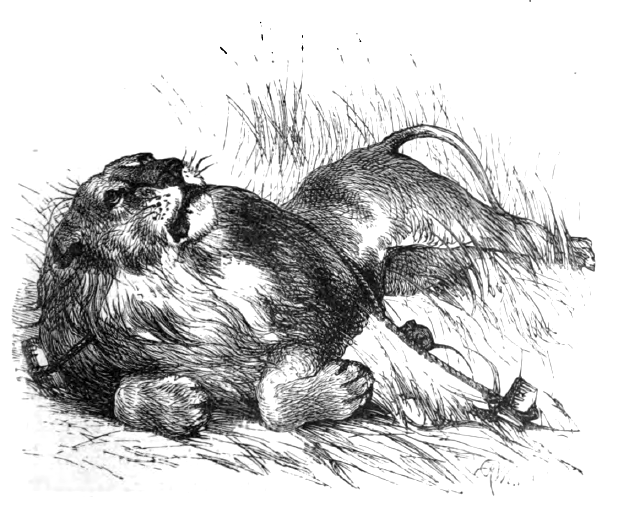 THE LION AND THE MOUSE. A
LlON was
awakened from sleep by a Mouse running
over his face. Rising up in anger, he caught him and was about to kill
him,
when the Mouse piteously entreated, saying: "If you would only spare my
life, I would be sure to repay your kindness." The Lion laughed and let
him go. It happened shortly after this that the Lion was caught by some
hunters, who bound him by strong ropes to the ground. The Mouse,
recognizing
his roar, came up, and gnawed the rope with his teeth, and setting him
free,
exclaimed: "You ridiculed the idea of my ever being able to help you,
not
expecting to receive from me any repayment of your favour; but now you
know
that it is possible for even a Mouse to confer benefits on a Lion." A FATHER had a
family of sons who were perpetually quarrelling among
themselves. When he failed to heal their disputes by his exhortations,
he
determined to give them a practical illustration of the evils of
disunion; and
for this purpose he one day told them to bring him a bundle of sticks.
When
they had done so, he placed the faggot into the hands of each of them
in
succession, and ordered them to break it in pieces. They each tried
with all
their strength, and were not able to do it. He next unclosed the
faggot, and
took the sticks separately, one by one, and again put them into their
hands, on
which they broke them easily. He then addressed them in these words:
"My
sons, if you are of one mind, and unite to assist each other, you will
be as
this faggot, uninjured by all the attempts of your enemies; but if you
are
divided among yourselves, you will be broken as easily as these
sticks."
A WOLF meeting
with a Lamb astray from the fold, resolved not to lay
violent hands on him, but to find some plea, which should justify to
the Lamb
himself his right to eat him. He thus addressed him: "Sirrah, last year
you grossly insulted me." "Indeed," bleated the Lamb in a
mournful tone of voice, "I was not then born." Then said the Wolf,
"You feed in my pasture." "No, good sir," replied the Lamb,
"I have not yet tasted grass." Again said the Wolf, "You drink
of my well." "No," exclaimed
the Lamb, "I never yet drank water, for as yet
my mother's milk is both food and drink to me." On which the Wolf
seized
him. and ate him up, saying, "Well! I won't
remain supperless, even though you refute every one of my
imputations." The tyrant
will
always
find a pretext for his tyranny. A Bat falling
upon the ground was caught by a Weasel, of whom he
earnestly sought his life. The Weasel refused, saying, that he was by
nature
the enemy of all birds. The Bat assured him that he was not a bird, but
a
mouse, and thus saved his life. Shortly afterwards the Bat again fell
on the
ground, and was caught by another Weasel, whom he likewise entreated
not to eat
him. The Weasel said that he had a special hostility to mice. The Bat
assured him
that he was not a mouse, but a bat; and thus a second time escaped. It is wise
to
turn
circumstances to good account. An Ass having
heard some Grasshoppers chirping, was highly enchanted;
and, desiring to possess the same charms of melody, demanded what sort
of food
they lived on, to give them such beautiful voices. They replied, "The
dew." The Ass resolved that he would only live upon dew, and in a short
time died of hunger.
A Wolf, having
a bone stuck in his throat, hired a Crane, for a large
sum, to put her head into his throat and draw out the bone. When the
Crane had
extracted the bone, and demanded the promised payment, the Wolf,
grinning and
grinding his teeth, exclaimed: "Why, you have surely already a
sufficient
recompense, in having been permitted to draw out your head in safety
from the
mouth and jaws of a wolf." In serving
the
wicked,
expect no reward, and be thankful if you escape injury for your pains. A
CHARCOAL-BURNER carried on his trade in his own house. One day he met
a friend, a Fuller, and entreated him to come and live with him,
saying, that
they should be far better neighbours, and that their housekeeping
expenses
would be lessened. The Fuller replied, "The arrangement is impossible
as
far as I am concerned, for whatever I should whiten, you would
immediately
blacken again with your charcoal." Like will
draw
like. A Boy was
hunting for locusts. He had caught a goodly number, when he
saw a Scorpion, and, mistaking him for a locust, reached out his hand
to take
him. The Scorpion, showing his sting, said: " If you had but touched
me,
my friend, you would have lost me, and all your locusts too! " The Ants were
employing a fine winter's day in drying grain collected in
the summer time. A Grasshopper, perishing with famine, passed by and
earnestly
begged for a little food. The Ants inquired of him, "Why did you not
treasure up food during the summer?" He replied, "I had not leisure
enough. I passed the days in singing." They then said in derision:
"If you were foolish enough to sing all the summer, you must dance
supperless to bed in the winter."
A COCK,
scratching for food for himself and his hens, found a precious
stone; on which he said: "If your owner had found thee, and not I, he
would have taken thee up, and have set thee in thy first estate; but I
have
found thee for no purpose. I would rather have one barleycorn than all
the
jewels in the world." The beasts of
the field and forest had a Lion as their king. He was
neither wrathful, cruel, nor tyrannical, but just and gentle as a king
could
be. He made during his reign a royal proclamation for a general
assembly of all
the birds and beasts, and drew up conditions for an universal league,
in which
the Wolf and the Lamb, the Panther and the Kid, the Tiger and the Stag,
the Dog
and the Hare, should live together in perfect peace and amity. The Hare
said,
"Oh, how I have longed to see this day, in which the weak shall take
their
place with impunity by the side of the strong." A FISHERMAN
skilled in music took his flute and his nets to the
sea-shore. Standing on a projecting rock he played several tunes, in
the hope
that the fish, attracted by his melody, would of their own accord dance
into
his net, which he had placed below. At last, having long waited in
vain, he
laid aside his flute, and casting his net into the sea, made an
excellent haul
of fish. When he saw them leaping about in the net upon the rock he
said:
"O you most perverse creatures, when I piped you would not dance, but
now
that I have ceased you do so merrily."
A HARE one day
ridiculed the short feet and slow pace of the Tortoise.
The latter, laughing, said: "Though you be swift as the wind, I will
beat
you in a race." The Hare, deeming her assertion to be simply
impossible,
assented to the proposal; and they agreed that the Fox should choose
the
course, and fix the goal. On the day appointed for the race they
started
together. The Tortoise never for a moment stopped, but went on with a
slow but
steady pace straight to the end of the course. The Hare, trusting to
his native
swiftness, cared little about the race, and lying down by the wayside,
fell
fast asleep. At last waking up, and moving as fast as he could, he saw
the
Tortoise had reached the goal, and was comfortably dozing after her
fatigue. A TRAVELLER,
about to set out on his journey, saw his Dog stand at the
door stretching himself. He asked him sharply: "What do you stand
gaping
there for? Everything is ready but you; so come with me instantly." The
Dog,
wagging his tail, replied: "O, master! I am quite ready; it is you for
whom I am waiting." The
loiterer
often
imputes delay to his more active friend. A CARTER was
driving a waggon along a country lane, when the wheels sank
down deep into a rut. The rustic driver, stupified and aghast, stood
looking at
the waggon, and did nothing but utter loud cries to Hercules to come
and help
him. Hercules, it is said, appeared, and thus addressed him: — "Put
your
shoulders to the wheels, my man. Goad on your bullocks, and never more
pray to
me for help, until you have done your best to help yourself, or depend
upon it
you will henceforth pray in vain." Self-help
is
the best
help
A Dog, crossing
a bridge over a stream with a piece of flesh in his
mouth, saw his own shadow in the water, and took it for that of another
Dog,
with a piece of meat double his own in size. He therefore let go his
own, and
fiercely attacked the other Dog, to get his larger piece from him. He
thus lost
both: that which he grasped at in the water, because it was a shadow;
and his
own, because the stream swept it away. A Mole, a
creature blind from its birth, once said to his mother:
"I am sure that I can see, mother!" In the desire to prove to him his
mistake, his mother placed before him a few grains of frankincense, and
asked,
"What is it?" The young Mole said, "It is a pebble." His
mother exclaimed: "My son, I am afraid that you are not only blind, but
that you have lost your sense of smell." The Swallow and
the Crow had a contention about their plumage. The Crow
put an end to the dispute by saying: "Your feathers are all very well
in
the spring, but mine protect me against the winter." Fine
weather
friends
are not worth much. A Farmer found
in the winter time a Snake stiff and frozen with cold. He
had compassion on it, and taking it up placed it in his bosom. The
Snake on
being thawed by the warmth quickly revived, when, resuming its natural
instincts, he bit his benefactor, inflicting on him a mortal wound. The
Farmer
said with his latest breath, "I am rightly served for pitying a
scoundrel!
" The
greatest
benefits
will not bind the ungrateful.
A HERDSMAN
tending kine in a forest, lost a Bull-calf from the fold.
After a Ions and fruitless search, he made a vow that, if he could only
discover the thief who had stolen the Calf, he would offer a lamb in
sacrifice
to Hermes, Pan, and the Guardian Deities of the forest. Not long
afterwards, as
he ascended a small hillock, he saw at its foot a Lion feeding on the
Calf.
Terrified at the sight, he lifted his eyes and his hands to heaven, and
said:
"Just now I vowed to offer a lamb to the Guardian Deities of the forest
if
I could only find out who had robbed me; but now that I have discovered
the
thief, I would willingly add a full-grown Bull to the Calf I have lost,
if I
may only secure my own escape from him in safety." A FARMER placed
nets on his newly-sown plough lands, and caught a
quantity of Cranes, which came to pick up his seed. With them he
trapped a
Stork also. The Stork having his leg fractured by the net, earnestly
besought
the Farmer to spare his life. "Pray, save me, Master," he said,
" and let me go free this once. My broken limb should excite your pity.
Besides, I am no Crane, I am a Stork, a bird of excellent character;
and see
how I love and slave for my father and mother. Look too, at my
feathers, they
are not the least like to those of a Crane." The Farmer laughed aloud,
and
said, "It may be all as you say; I only know this, I have taken you
with
these robbers, the Cranes, and you must die in their company." Birds of a
feather
flock together.
A YOUNG Fawn
once said to his mother, "You are larger than a dog,
and swifter, and more used to running, and you have too your horns as a
defence; why, then, Mother! are you always in such a terrible fright of
the
hounds?" She smiled, and said: "I know full well, my son, that all
you say is true. I have the advantages you mention, but yet when I hear
only
the bark of a single dog I feel ready to faint, and fly away as fast as
I
can." No
arguments
will give
courage to the coward. THE Pomegranate
and Apple-tree disputed as to which was the most
beautiful. When their strife was at its height, a Bramble from the
neighbouring
hedge lifted up its voice, and said in a boastful tone: "Pray, my dear
friends, in my presence at least cease from such vain disputings." A Mountain was
once greatly agitated. Loud groans and noises were heard;
and crowds of people came from all parts to see what was the matter.
While they
were assembled in anxious expectation of some terrible calamity, out
came a
Mouse. Don't make
much
ado
about nothing. A BEAR boasted
very much of his philanthropy, saying "that of all
animals he was the most tender in his regard for man, for he had such
respect
for him, that he would not even touch his dead body." A Fox hearing
these
words said with a smile to the Bear, "Oh! that you would eat the dead
and
not the living."
The Ass and the
Fox having entered into partnership together for their
mutual protection, went out into the forest to hunt. They had not
proceeded
far, when they met a Lion. The Fox, seeing the imminency of the danger,
approached the Lion, and promised to contrive for him the capture of
the Ass,
if he would pledge his word that his own life should not be endangered.
On his
assuring him that he would not injure him, the Fox led the Ass to a
deep pit,
and contrived that he should fall into it. The Lion seeing that the Ass
was
secured, immediately clutched the Fox, and then attacked the Ass at his
leisure A JAR of Honey
having been upset in a housekeeper's room, a number of
flies were attracted by its sweetness, and placing their feet in it,
ate it
greedily. Their feet however became so smeared with the honey that they
could
not use their wings, nor release themselves, and were suffocated. Just
as they
were expiring, they exclaimed, "O foolish creatures that we are, for
the
sake of a little pleasure we have destroyed ourselves." Pleasure
bought
with
pains, hurts A Man and a
Lion travelled together through the forest. They soon began
to boast of their respective superiority to each other in strength and
prowess.
As they were disputing, they passed a statue, carved in stone, which
represented "a Lion strangled by a Man." The traveller pointed to it
and said: "See there! How strong we are, and how we prevail over even
the
king of beasts." The Lion replied: "This statue was made by one of
you men. If we Lions knew how to erect statues, you would see the Man
placed
under the paw of the Lion." One story
is
good, till
another is told.
A TORTOISE,
lazily basking in the sun, complained to the sea-birds of
her hard fate, that no one would teach her to fly. An Eagle hovering
near,
heard her lamentation, and demanded what reward she would give him, if
he would
er aloft, and float her in the air. "I will give you," she said,
"all the riches of the Red Sea." "I will teach you to fly
then," said the Eagle; and taking her up in his talons, he carried her
almost to the clouds, — when suddenly letting her go, she fell on a
lofty
mountain, and dashed her shell to pieces. The Tortoise exclaimed in the
moment
of death: "I have deserved my present fate; for what had I to do with
wings and clouds, who can with difficulty move about on the earth?" If men had
all
they
wished, they would be often ruined. SOME Cranes
made their feeding grounds on some plough-lands newly sown
with wheat. For a long time the Farmer, brandishing an empty sling,
chased them
away by the terror he inspired; but when the birds found that the sling
was
only swung in the air, they ceased to take any notice of it, and would
not
move. The farmer on seeing this, charged his sling with stones, and
killed a
great number. They at once forsook his plough-lands, and cried to each
other,
"It is time for us to be off to Liliput: for this man is no longer
content
to scare us, but begins to show us in earnest what he can do." If words
suffice not,
blows must follow.
A Fox having
fallen into a deep well, was detained a prisoner there, as
he could find no means of escape. A Goat, overcome with thirst, came to
the
same well, and, seeing the Fox, inquired if the water was good. The
Fox,
concealing his sad plight under a merryguise, indulged in a lavish
praise of
the water, saying it was beyond measure excellent, and encouraged him
to
descend. The Goat, mindful only of his thirst, thoughtlessly jumped
down, when
just as he quenched his thirst, the Fox informed him of the difficulty
they
were both in, and suggested a scheme for their common escape. "If,"
said he, "you will place your fore-feet upon the wall, and bend your
head,
I will run up your back and escape, and will help you out afterwards."
On
the Goat readily assenting to this second proposal, the Fox
leapt upon his back, and steadying himself with the Goat's horns,
reached in
safety the mouth of the well, when he immediately made off as fast as
he could.
The Goat upbraided him with the breach of his bargain, when he turned
round and
cried out: "You foolish old fellow! If you had as many brains in your
head
as you have hairs in your beard, you would never have gone down before
you had
inspected the way up, nor have exposed yourself to dangers from which
you had
no means of escape." Look
before you
leap. A CONTROVERSY
prevailed among the beasts of the field, as to which of
the animals deserved the most credit for producing the greatest number
of
whelps at a birth. They rushed clamorously into the presence of the
Lioness,
and demanded of her the settlement of the dispute. "And
you," they said, "how many sons have you at a birth?" The
Lioness laughed at them, and said: "Why! I have only one; but that one
is
altogether a thorough-bred Lion." The value
is in
the
worth, not in the number.
Two men were
travelling together, when a Bear suddenly met them on their
path. One of them climbed up quickly into a tree, and concealed himself
in the
branches. The other, seeing that he must be attacked, fell flat on the
ground,
and when the Bear came up and felt him with his snout, and smelt him
all over,
he held his breath, and feigned the appearance of death as much as he
could.
The Bear soon left him, for it is said he will not touch a dead body.
When he
was quite gone, the other traveller descended from the tree, and
accosting his
friend, jocularly inquired "what it was the Bear had whispered in his
ear?"
he replied, "He gave me this advice: Never travel with a friend who
deserts you at the approach of danger." Misfortune
tests the
sincerity of friends. A PIGEON,
oppressed by excessive thirst, saw a goblet of water painted
on a sign-board. Not supposing it to be only a picture, she flew
towards it
with a loud whirr, and unwittingly dashed against the sign-board and
jarred
herself terribly. Having broken her wings by the blow, she fell to the
ground,
and was caught by one of the bystanders. Zeal
should not
outrun
discretion. A HEAVY wagon
was being dragged along a country lane by a team of oxen.
The axle-trees groaned and creaked terribly: when the oxen turning
round, thus
addressed the wheels. "Hullo there! why do you make so much noise? We
bear
all the labour, and we, not you, ought to cry out." Those who
suffer most
cry out the least.
A DOG lay in a
manger, and by his growling and snapping prevented the
oxen from eating the hay which had been placed for them. "What a
selfish
Dog!" said one of them to his companions; "he cannot eat the hay
himself, and yet refuses to allow those to eat who can." A LlON being
unable from old age and infirmities to provide himself with
food by force, resolved to do so by artifice. He betook himself to his
den, and
lying down there, pretended to be sick, taking care that his sickness
should be
publicly known. The beasts expressed their sorrow, and came one by one
to his
den to visit him, when the Lion devoured them. After many of the beasts
had
thus disappeared, the Fox discovered the trick, and presenting himself
to the
Lion, stood on the outside of the cave, at a respectful distance, and
asked of
him how he did; to whom he replied, "I am very middling, but why do you
stand without? pray enter within to talk with me." The Fox replied,
"No, thank you, I notice that there are many prints of feet entering
your
cave, but I see no trace of any returning." He is wise
who
is
warned by the misfortunes of others. A Raven saw a
Swan, and desired to secure for himself a like beauty of
plumage. Supposing that his splendid white colour arose from his
washing in the
water in which he swam, the Raven left the altars in the neighbourhood
of which
he picked up his living, and took up his abode in the lakes and pools.
But
cleansing his feathers as often as he would, he could not change their
colour,
while through want of food he perished. Change of
habit
cannot
alter Nature.
A Cat caught a
Cock, and took counsel with himself how he might find a
reasonable excuse for eating him. He accused him as being a nuisance to
men, by
crowing in the night time, and not permitting them to sleep. The Cock
defended
himself by saying, that he did this for the benefit of men, that they
might
rise betimes for their labours. The Cat replied, "Although you abound
in
specious apologies, I shall not remain supperless;" and he made a meal
of
him. A MAN who had
travelled in foreign lands, boasted very much, on
returning to his own country, of the many wonderful and heroic things
he had
done in the different places he had visited. Among other things, he
said that
when he was at Rhodes he had leapt to such a distance that no man of
his day
could leap anywhere near him — and as to that, there were in Rhodes
many
persons who saw him do it, and whom he could call as witnesses. One of
the
bystanders interrupting him, said: "Now, my good man, if this be all
true
there is no need of witnesses. Suppose this to be Rhodes; and now for
your
leap." ONCE upon a
time a Wolf resolved to disguise his nature by his habit,
that so he might get food without stint. Encased in the skin of a
sheep, he pastured
with the flock, beguiling the shepherd by his artifice. In the evening
he was
shut up by the shepherd in the fold; the gate was closed, and the
entrance made
thoroughly secure. The shepherd coming into the fold during the night
to
provide food for the morrow, caught up the Wolf, instead of a sheep,
and killed
him with his knife in the fold. Harm seek,
harm
find.
A LlON demanded
the daughter of a woodcutter in marriage. The Father,
unwilling to grant, and yet afraid to refuse his request, hit upon this
expedient to rid himself of his importunities. He expressed his
willingness to
accept him as the suitor of his daughter on one condition; that he
should allow
him to extract his teeth, and cut off his claws, as his daughter was
fearfully
afraid of both. The Lion cheerfully assented to the proposal: when
however he
next repeated his request, the woodman, no longer afraid, set upon him
with his
club, and drove him away into the forest. A Goatherd had
sought to bring back a stray goat to his flock. He
whistled and sounded his horn in vain; the straggler paid no attention
to the
summons. At last the Goatherd threw a stone, and breaking its horn,
besought
the Goat not to tell his master. The Goat replied, "Why, you silly
fellow,
the horn will speak though I be silent." Do not
attempt
to hide
things which cannot be hid. A Miser sold
all that he had, and bought a lump of gold, which he took
and buried in a hole dug in the ground by the side of an old wall, and
went
daily to look at it. One of his workmen, observing his frequent visits
to the
spot, watched his movements, discovered the secret of the hidden
treasure, and
digging down, came to the lump of gold, and stole it. The Miser, on his
next
visit, found the hole empty, and began to tear his hair, and to make
loud
lamentations. A neighbour, seeing him overcome with grief, and learning
the
cause, said, "Pray do not grieve so; but go and take a stone, and place
it
in the hole, and fancy that the gold is still lying there. It will do
you quite
the same service; for when the gold was there, you had it not, as you
did not
make the slightest use of it."
The Frogs,
grieved at having no established Ruler, sent ambassadors to
Jupiter entreating for a King. He, perceiving their simplicity, cast
down a
huge log into the lake. The Frogs, terrified at the splash occasioned
by its
fall, hid themselves in the depths of the pool. But no sooner did they
see that
the huge log continued motionless, than they swam again to the top of
the
water, dismissed their fears, and came so to despise it as to climb up,
and to
squat upon it. After some time they began to think themselves
ill-treated in
the appointment of so inert a Ruler, and sent a second deputation to
Jupiter to
pray that he would set over them another sovereign. He then gave them
an Eel to
govern them. When the Frogs discovered his easy good nature, they yet a
third
time sent to Jupiter to see that he
would once more choose for them another King. Jupiter,
displeased at their complaints, sent a Heron, who preyed upon the Frogs
day by
day till there were none left to croak upon the Lake. A YOUNG Pig was
shut up in a fold-yard with a Goat and a Sheep. On one
occasion the Shepherd laid hold of him, when he grunted, and squeaked,
and
resisted violently. The Sheep and the Goat complained of his
distressing cries,
and said, "he often
handles us, and we do not cry out." To this he replied,
"Your handling and mine are very different things. He catches you only
for
your wool, or your milk, but he lays hold on me for my very life." A BOY put his hand
into a pitcher full of filberts. He grasped as many as
he could possibly hold, but when he endeavoured to pull out his hand,
he was
prevented from doing so by the neck of the pitcher. Unwilling to lose
his
filberts, and yet unable to withdraw his hand, he burst into tears, and
bitterly lamented his disappointment. A bystander said to him, "Be
satisfied with half the quantity, and you will readily draw out your
hand." Do not
attempt
too much
at once.
A Snake, having
made his hole close to the porch of a cottage, inflicted
a severe bite on the Cottager's infant son, of which he died, to the
great grief
of his parents. The father resolved to kill the Snake, and the next
day, on its
coming out of its hole for food, took up his axe; but, making too much
haste to
hit him as he wriggled away, missed his head, and cut off only the end
of his
tail. After some time the Cottager, afraid lest the Snake should bite
him also,
endeavoured to make peace, and placed some bread and salt in his hole.
The
Snake, slightly hissing, said: "There can henceforth be no peace
between
us; for whenever I see you I shall remember the loss of my tail, and
whenever
you see me you will be thinking of the death of your son." No one
truly
forgets
injuries in the presence of him who caused the injury. A MULETEER set
forth on a journey, driving before him an Ass and a Mule,
both well laden. The Ass, as long as he travelled along the plain,
carried his
load with ease; but when he began to ascend the steep path of the
mountain, he
felt his load to be more than he could bear. He entreated his companion
to
relieve him of a small portion, that he might carry home the rest; but
the Mule
paid no attention to the request. The Ass shortly afterwards fell down
dead
under his burden. The Muleteer, not knowing what else to do in so wild
a
region, placed upon the Mule the load carried by the Ass in addition to
his
own, and at the top of all placed the hide of the Ass, after he had
flayed him.
The Mule, groaning beneath his heavy burden, said thus to himself: "I
am
treated according to my deserts. If I had only been willing to assist
the Ass a
little in his need, I should not now be bearing, together with his
burden,
himself as well.''
A GROOM used to
spend whole days in currycombing and rubbing down his
Horse, but at the same time stole his oats, and sold them for his own
profit.
"Alas!" said the Horse, "if you really wish me to be in good
condition, you should groom me less, and feed me more." Honesty is
the
best
policy. A Man had an
Ass, and a Maltese Lap-dog, a very great beauty. The Ass
was left in a stable, and had plenty of oats and hay to eat, just as
any other
Ass would. The
Lap-dog knew many tricks, and was a great favourite with his
master, who often fondled him, and seldom went out to dine or to sup
without bringing
him
home some tit-bit to eat, when he frisked and jumped about him in a
manner
pleasant to see. The Ass, on the contrary, had much work to do, in
grinding the
corn-mill, and in carrying wood from the forest or burdens from the
farm. He
often lamented his own hard fate, and contrasted it with the luxury and
idleness of the Lap-dog, till at last one day he broke his cords and
halter,
and galloped into his master's house, kicking up his heels without
measure, and
frisking and fawning as well as he could. He next tried to jump about
his
master as he had seen the Lap-dog do, but he broke the table, and
smashed all
the dishes upon it to atoms. He then attempted to lick his master, and
jumped
upon his back. The servants hearing the strange hubbub, and perceiving
the
danger of their master, quickly relieved him, and drove out the Ass to
his
stable, with kicks, and clubs and cuffs. The Ass, as he returned to his
stall
beaten nearly to death, thus lamented: "I have brought it all on
myself!
Why could I not have been contented to labour with my companions, and
not wish
to be idle all the day like that useless little Lap-dog!"
The Oxen once
on a time sought to destroy the Butchers, who practised a trade
destructive to their race. They assembled on a certain day to carry out
their
purpose, and sharpened their horns for the contest. One of them, an
exceedingly
old one (for many a field had he ploughed), thus spoke: "These
Butchers,
it is true, slaughter us, but they do so with skilful hands, and with
no
unnecessary pain. If we get rid of them, we shall fall into the hands
of
unskilful operators, and thus suffer a double death: for you may be
assured,
that though all the Butchers should perish, yet will men never want
beef." Do not be
in a
hurry to
change one evil for another. A Liox,
fatigued by the heat of a summer's day, fell fast asleep in his
den. A Mouse ran over his mane and ears, and woke him from his
slumbers. He
rose up and shook himself in great wrath, and searched every corner of
his den
to find the Mouse. A Fox seeing him, said: "A fine Lion you are, to be
frightened of a Mouse." "'Tis not the Mouse I fear," said the
Lion; "I resent his familiarity and ill-breeding." Little
liberties are
great offences. A Shepherd-boy,
who watched a flock of sheep near a village, brought out
the villagers three or four times by crying out, "Wolf! Wolf!' and when
his neighbours came to help him, laughed at them for their pains. The
Wolf,
however, did truly come at last. The Shepherd-boy, now really alarmed,
shouted
in an agony of terror: "Pray, do come and help me; the Wolf is killing
the
sheep;" but no one paid any heed to his cries, nor rendered any
assistance. The Wolf, having no cause of fear, took it easily, and
lacerated or
destroyed the whole flock. There is
no
believing a
liar, even when he speaks the truth.
A Dog used to
run up quietly to the heels of everyone he met, and to
bite them without notice. His master suspended a bell about his neck,
that he
might give notice of his presence wherever he went. The Dog grew proud
of his
bell, and went tinkling it all over the market-place. An old hound said
to him:
"Why do you make such an exhibition of yourself? That bell that you
carry
is not, believe me, any order of merit, but, on the contrary a mark of
disgrace, a public notice to all men to avoid you as an ill-mannered
dog." Notoriety
is
often
mistaken for fame Some Boys,
playing near a pond, saw a number of Frogs in the water, and
began to pelt them with stones. They killed several of them, when one
of the
Frogs, lifing his head out of the water, cried out: "Pray
stop, my boys: what is sport to you, is death to us." A Pedlar,
dealing in salt, drove his Ass to the seashore to buy salt.
His road home lay across a stream, in passing which his Ass, making a
false
step, fell by accident into the water, and rose up again with his load
considerably lighter, as the water melted the salt. The Pedlar retraced
his
steps, and refilled his panniers with a larger quantity of salt than
before.
When he came again to the stream, the Ass fell down on purpose in the
same spot,
and, regaining his feet with the weight of his load much diminished,
brayed
triumphantly as if he had obtained what he desired. The Pedlar saw
through his
trick, and drove him for the third time to the coast, where he bought a
cargo
of sponges instead of salt. The Ass, again playing the knave, when he
reached
the stream, fell down on purpose, when the sponges becoming swollen
with the
water, his load was very greatly increased; and thus his trick recoiled
on
himself in fitting to his back a doubled burden.
A SICK Stag lay
down in a quiet corner of its pastureground. His
companions came in great numbers to inquire after his health, and each
one
helped himself to a share of the food which had been placed for his
use; so
that he died, not from his sickness, but from the failure of the means
of
living. Evil
companions
bring
more hurt than profit. A GOATHERD,
driving his flock from their pasture at eventide, found some
wild goats mingled among them, and shut them up together with his own
for the
night. On the morrow
it snowed very hard, so that he could not take the herd to
their usual feeding-places, but was obliged to keep them in the fold.
He gave
his own goats just sufficient food to keep them alive, but fed the
strangers
more abundantly, in the hope of enticing them to stay with him, and of
making
them his own. When the thaw set in, he led them all out to feed, and
the wild
goats scampered away as fast as they could to the mountains. The
Goatherd taxed
them with their ingratitude in leaving him, when during the storm he
had taken
more care of them than of his own herd. One of them turning about said
to him,
"That is the very reason why we are so cautious; for if you yesterday
treated us better than the Goats you have had so long, it is plain also
that if
others came after us, you would, in the same manner, prefer them to
ourselves." Old
friends
cannot with
impunity be sacrificed for new ones. A Boy was stung
by a Nettle. He ran home and told his mother, saying,
"Although it pains me so much, I did but touch it ever so gently."
"That was just it," said his mother, "which caused it to sting
you. The next time you touch a Nettle, grasp it boldly, and it will be
soft as
silk to your hand, and not in the least hurt you." Whatever
you
do, do
with all your might.
A Fox caught in
a trap, escaped with the loss of his "brush."
Henceforth feeling his life a burden from the shame and ridicule to
which he
was exposed, he schemed to bring all the other Foxes into a like
condition with
himself, that in the common loss he might the better conceal his own
deprivation. He assembled a good many Foxes, and publicly advised them
to cut
off their tails, saying "that they would not only look much better
without
them, but that they would get rid of the weight of the brush, which was
a very
great inconvenience." One of them interrupting him said, " If you had
not yourself lost your tail, my friend, you would not thus counsel us."
A MIDDLE-AGED
man, whose hair had begun to turn grey, courted two women
at the same time. One of them was young; and the other, well advanced
in years.
The elder woman, ashamed to be courted by a man younger than herself,
made a
point, whenever her admirer visited her, to pull out some portion of
his black
hairs. The younger, on the contrary, not wishing to become the wife of
an old
man, was equally zealous in removing every grey hair she could find.
Thus it
came to pass, that between them both he very soon found that he had not
a hair
left on his head. Those who
seek
to
please everybody please nobody. An Astronomer
used to go out of a night to observe the stars. One
evening, as he wandered through the suburbs with his whole attention
fixed on
the sky, he fell unawares into a deep well. While he lamented and
bewailed his
sores and bruises, and cried loudly for help, a neighbour ran to the
well, and
learning what had happened said: "Hark ye, old fellow, why, in striving
to
pry into what is in heaven, do you not manage to see what is on earth?"
JUPITER
determined, it is said, to create a sovereign over the birds;
and made proclamation that, on a certain day, they should all present
themselves before him, when he would himself choose the most beautiful
among
them to be king. The Jackdaw, knowing his own ugliness, searched
through the
woods and fields, and collected the feathers which had fallen from the
wings of
his companions, and stuck them in all parts of his body, hoping thereby
to make
himself the most beautiful of all. When the appointed day arrived, and
the
birds had assembled before Jupiter, the Jackdaw also made his
appearance in his
many-feathered finery. On Jupiter proposing to make him king, on
account of the
beauty of his plumage, the birds indignantly protested, and each
plucking from
him his own feathers, the Jackdaw was again nothing but a Jackdaw. "Why should
there always be this internecine and implacable warfare
between us?" said the Wolves to the Sheep. "Those evil-disposed Dogs
have much to answer for. They always bark whenever we approach you, and
attack
us before we have done any harm. If you would only dismiss them from
your
heels, there might soon be treaties of peace and of reconciliation
between
us." The Sheep, poor silly creatures! were easily beguiled, and
dismissed
the Dogs. The Wolves destroyed the unguarded flock at their own
pleasure. A Cat, hearing
that the Birds in a certain aviary were ailing, dressed
himself up as a physician, and, taking with him his cane and the
instruments
becoming his profession, went to the aviary, knocked at the door, and
inquired
of the inmates how they all did, saying that if they were ill, he would
be
happy to prescribe for them and cure them. They replied, "We are all
very
well, and shall continue so, if you will only be good enough to go
away, and
leave us as we are."
A KlD standing
on the roof of a house, out of harm's way, saw a Wolf
passing by: and immediately began to taunt and revile him. The Wolf,
looking
up, said: "Sirrah! I hear thee: yet it is not thou who mockest me, but
the
roof on which thou art standing." Time and
place
often
give the advantage to the weak over the strong. A Farmer being
on the point of death wished to ensure from his sons the
same attention to his farm as he had himself given it. He called them
to his
bedside, and said, "My sons, there is a great treasure hid in one of my
vineyards." The sons after his death took their spades and mattocks,
and
carefully dug over every portion of their land. They found no treasure,
but the
vines repaid their labour by an extraordinary and superabundant crop. A HEIFER saw an
Ox hard at work harnessed to a plough, and tormented him
with reflections on his unhappy fate in being compelled to labour.
Shortly
afterwards, at the harvest home, the owner released the Ox from his
yoke, but
bound the Heifer with cords, and led him away to the altar to be slain
in
honour ot the festival. The Ox saw what was being done, and said with a
smile
to the Heifer: "For this you were allowed to live in idleness, because
you
were presently to be sacrificed."
An Ox drinking
at a pool, trod on a brood of young frogs, and crushed
one of them to death. The mother coming up, and missing one of her
sons,
inquired of his brothers what had become of him. "He is dead, dear
mother;
for just now a very huge beast with four great feet came to the pool,
and
crushed him to death with his cloven heel." The Frog, puffing herself
out,
inquired, "if the beast was as big as that in size." "Cease,
mother, to puff yourself out," said her son, "and do not be angry;
for you would, I assure you, sooner burst than successfully imitate the
hugeness of that monster." An old woman
having lost the use of her eyes, called in a Physician to
heal them, and made this bargain with him in the presence of witnesses:
that if
he should cure her blindness, he should receive from her a sum of
money; but if
her infirmity remained, she should give him nothing. This agreement
being
entered into, the Physician, time after time, applied his salve to her
eyes,
and on every visit taking something away, stole by little and little
all her
property: and when he had got all she had, he healed her, and demanded
the
promised payment. The old woman, when she recovered her sight and saw
none of
her goods in her house, would give him nothing. The Physician insisted
on his
claim, and, as she still refused, summoned her before the Archons. The
old
woman standing up in the Court thus spoke: — "This man here speaks the
truth in what he says; for I did promise to give him a sum of money, if
I
should recover my sight: but if I continued blind, I was to give him
nothing.
Now he declares 'that I am healed! I on the
contrary
affirm 'that I am still blind;' for when I lost the use of my eyes, I
saw in my
house various chattels and valuable goods: but now, though he swears I
am cured
of my blindness, I am not able to see a single thing in it."
Two Game Cocks
were fiercely fighting for the mastery of the farm-yard.
One at last put the other to flight. The vanquished Cock skulked away
and hid
himself in a quiet corner. The conqueror, flying up to a high wall,
flapped his
wings and crowed exultingly with all his might. An Eagle sailing
through the
air pounced upon him, and carried him off in his talons. The vanquished
Cock
immediately came out of his corner, and ruled henceforth with
undisputed
mastery. Pride goes
before
destruction. A CHARGER,
feeling the infirmities of age, betook him to a mill instead
of going out to battle. But when he was compelled to grind instead of
serving
in the wars, he bewailed his change of fortune, and called to mind his
former
state, saying, "Ah! Miller, I had indeed to go a campaigning before,
but I
was barbed from counter to tail, and a man went along to groom me; and
now, I
cannot tell what ailed me to prefer the mill before the battle."
"Forbear," said the Miller to him, "harping on what was of yore,
for it is the common lot of mortals to sustain the ups and downs of
fortune." A Monkey once
danced in an assembly of the Beasts, and so pleased them
all by his performance that they elected him their King. A Fox envying
him the
honour, discovered a piece of meat lying in a trap, and leading the
Monkey to
the place where it was said, "that she had found a store, but had not
used
it, but had kept it for him as treasure trove of his kingdom, and
counselled
him to lay hold of it." The Monkey approached carelessly, and was
caught
in the trap; and on his accusing the Fox of purposely leading him into
the
snare, she replied, "O Monkey, and are you, with such a mind as yours,
going to be King over the Beasts?"
A HORSE Soldier
took the utmost pains with his charger. As long as the
war lasted, he looked upon him as his fellow-helper in all emergencies,
and fed
him carefully with hay and corn.
When the war
was over, he only allowed him chaff to eat, and made him
carry heavy loads of wood, and subjected him to much slavish drudgery
and ill-treatment.
War, however, being again proclaimed, and the trumpet summoning him to
his
standard, the Soldier put on his charger its military trappings, and
mounted,
being clad in his heavy coat of mail. The Horse fell down straightway
under the
weight, no longer equal to the burden, and said to his master, "You
must
now e'en go to the war on foot, for you have transformed me from a
Horse into
an Ass; and how can you expect that I can again turn in a moment from
an Ass to
a Horse?"
The members of
the Body rebelled against the Belly, and said, "Why
should we be perpetually engaged in administering to your wants, while
you do
nothing but take your rest, and enjoy yourself in luxury and
selfindulgence
?" The members carried out their resolve, and refused their assistance
to
the Body. The whole Body quickly became debilitated, and the hands,
feet,
mouth, and eyes, when too late, repented of their folly.
A Vine was
luxuriant in the time of vintage with leaves and grapes. A
Goat, passing by, nibbled its young tendrils and its leaves. The Vine
addressed
him, and said: "Why do you thus injure me without a cause, and crop my
leaves? Is there no young grass left? But I shall not have to wait long
for my
just revenge; for if you now should crop my leaves, and cut me down to
my root,
I shall provide the wine to pour over you when you are led as a victim
to the
sacrifice." Jupiter issued
a proclamation to all the beasts of the forest, and promised
a royal reward to the one whose offspring should be deemed the
handsomest. The
Monkey came with the rest, and presented, with all a mother's
tenderness, a
flat-nosed, hairless, ill-featured young Monkey as a candidate for the
promised
reward. A general laugh saluted her on the presentation of her son. She
resolutely said, "I know not whether Jupiter will allot the prize to my
son; but this I do know, that he is at least in the eyes of me his
mother, the
dearest, handsomest, and most beautiful of all." A WIDOW woman,
fond of cleaning, had two little maidens to wait on her.
She was in the habit of waking them early in the morning, at cockcrow.
The
maidens being aggrieved by such excessive labour, resolved to kill the
cock who
roused their mistress so early. When they had done this, they found
that they
had only prepared for themselves greater troubles, for their mistress,
no
longer hearing the hour from the cock, woke them up to their work in
the middle
of the night.
THE Pigeons,
terrified by the appearance of a Kite, called upon the Hawk
to defend them. He at once consented. When they had admitted him into
the cote,
they found that he made more havoc and slew a larger number of them in
one day,
than the Kite could pounce upon in a whole year. Avoid a
remedy
that is
worse than the disease. The Dolphins
and Whales waged a fierce warfare with each other. When the
battle was at its height, a Sprat lifted its head out of the waves, and
said
that he would reconcile their differences, if they would accept him as
an
umpire. One of the Dolphins replied, "We would far rather be destroyed
in
our battle with each other, than admit any interference from you in our
affairs." A Swallow,
returning from abroad, and ever fond of
dwelling with men, built herself a nest in the wall of a Court of
Justice, and
there hatched seven young birds. A Serpent gliding past the nest, from
its hole
in the wall, ate up the young unfledged nestlings. The Swallow finding
her nest
empty, lamented greatly, and exclaimed: "Woe to me a stranger! that in
this place where all others' rights are protected, I alone should
suffer wrong."
A RIVER carried
down in its stream two Pots, one made of earthenware,
and the other of brass. The Earthen Pot said to the Brass Pot, "Pray
keep
at a distance, and do not come near me: for if you touch me ever so
slightly, I
shall be broken in pieces; and besides, I by no means wish to come near
you." Equals
make the
best
friends. A Shepherd once
found the whelp of a Wolf, and brought it up, and after
a while taught it to steal lambs from the neighbouring flocks. The Wolf
having
shown himself an apt pupil, said to the Shepherd, "Since you have
taught
me to steal, you must keep a sharp look-out, or you will
lose some of your own
flock." A Crab said to
her son, "Why do you walk so one-sided,
my child? It is far more becoming to go straightforward." The young
Crab
replied: "Quite true, dear mother; and if you will show me the straight
way, I will promise to walk in it." The mother tried in vain, and
submitted without remonstrance to the reproof of her child. Example is
more
powerful than precept. A MAN had two
daughters, the one married to a gardener, and the other to
a tile-maker. After a time he went to the daughter who had married the
gardener, and inquired how she was, and how all things went with her.
She said,
"All things are prospering with me, and I have only one wish, that
there
may be a heavy fall of rain, in order that the plants may be well
watered." Not long after he went to the daughter who had married the
tile-maker, and likewise inquired of her how she fared; she replied, "I
want for nothing, and have only one wish, that the dry weather may
continue,
and the sun shine hot and bright, so that the bricks might be dried."
He
said to her, "If your sister wishes for rain, and you for dry weather,
with which of the two am I to join my wishes?"
A Boy stole a
lesson-book from one of his schoolfellows, and took it
home to his mother. She not only abstained from beating him, but
encouraged
him. He next time stole a cloak and brought it to her, when she yet
further
commended him. The Youth, advanced to man's estate, proceeded to steal
things
of greater value. At last he was taken in the very act, and, having his
hands
bound behind him, was led away to the place of public execution. His
mother
followed in the crowd and violently beat her breast in sorrow, whereon
the
young man said, "I wish to say something to my mother in her ear."
She came close to him, when he quickly
seized her ear with his teeth and bit it off. The Mother
upbraided him as an unnatural child, whereon he replied, "Ah! if you
had
beaten me, when I first stole and brought to you that lessonbook, I
should not
have come to this, nor have been thus led to a disgraceful death." An old man was
employed in cutting wood in the forest, and, in carrying
the faggots into the city for sale one day, being very wearied with his
long
journey, he sat down by the wayside, and, throwing down his load,
besought
"Death to come." Death immediately appeared, in answer to his
summons, and asked for what reason he had called him. The old man
replied,
"That, lifting up the load, you may place it again upon my
shoulders." A FlR Tree said
boastingly to the Bramble, "You are useful for
nothing at all; while I am everywhere used for roofs and houses." The
Bramble made answer: "You poor creature, if you would only call to mind
the axes and saws which are about to hew you down, you would have
reason to
wish that you had grown up a Bramble, not a Fir Tree." Better
poverty
without
care, than riches with.
A Mouse who
always lived on the land, by an unlucky chance formed an
intimate acquaintance with a Frog, who lived for the most part in the
water.
The Frog, one day intent on mischief, bound the foot of the Mouse
tightly to
his own. Thus joined together, the Frog first of all led his friend the
Mouse
to the meadow where they were accustomed to find their food. After
this, he
gradually led him towards the pool in which he lived, until he reached
the very
brink, when suddenly jumping in he dragged the Mouse in with him. The
Frog
enjoyed the water amazingly, and swam croaking about, as if he had done
a
meritorious action. The unhappy Mouse was soon suffocated with the
water, and
his dead body floated about on the surface, tied to the foot of the
Frog. A
Hawk observed it, and, pouncing upon it with his talons, carried it up
aloft.
The Frog being still fastened to the leg of the Mouse, was also carried
off a
prisoner, and was eaten by the Hawk. Harm
hatch,
harm catch. The purchaser
of a black servant was persuaded that the colour of his
skin arose from dirt contracted through the neglect of his former
masters. On
bringing him home he resorted to every means of cleaning, and subjected
him to
incessant scrubbings. He caught a severe cold, but he never changed his
colour
or complexion. What's
bred in
the bone
will stick to the flesh. A Fisherman,
engaged in his calling, made a very successful cast, and
captured a great haul of fish. He managed by a skilful handling of his
net to
retain all the large fish, and to draw them to the shore; but he could
not
prevent the smaller fish from falling back through the meshes of the
net into
the sea.
A WOLF, sorely
wounded and bitten by dogs, lay sick and maimed in his
lair. Being in want of food, he called to a Sheep, who was passing, and
asked
him to fetch some water from a stream flowing close beside him.
"For," he said, "if you will bring me drink, I will find means
to provide myself with meat." "Yes," said the Sheep, "if I
should bring you the draught, you would doubtless make me provide the
meat
also." Hypocritical
speeches
are easily seen through. A Man who had
been bitten by a Dog, went about in quest of some one who
might heal him. A friend meeting him, and learning what he wanted,
said,
"If you would be cured, take a piece of bread, and dip it in the blood
from your wound, and go and give it to the Dog that bit you." The Man
who
had been bitten, laughed at this advice, and said, "Why? If I should do
so, it would be as if I should pray every Dog in the town to bite me." Benefits
bestowed upon
the evil-disposed, increase their means of injuring you. A HUNTSMAN,
returning with his dogs from the field, fell in by chance
with a Fisherman, bringing home a basket well laden with fish. The
Huntsman
wished to have the fish; and their owner experienced an equal longing
for the
contents of the game-bag. They quickly agreed to exchange the produce
of their
day's sport. Each was so well pleased with his bargain, that they made
for some
time the same exchange day after day. A neighbour said to them, "If you
go
on in this way, you will soon destroy, by frequent use, the pleasure of
your
exchange, and each will again wish to retain the fruits of his own
sport." Abstain
and
enjoy.
A CROW having
stolen a bit of flesh, perched in a tree, and held it in
her beak. A Fox seeing her, longed to possess himself of the flesh: and
by a
wily stratagem succeeded. "How handsome is the Crow," he exclaimed,
"in the beauty of her shape and in the fairness of her complexion! Oh,
if
her voice were only equal to her beauty, she would deservedly be
considered the
Queen of Birds!" This he said deceitfully; but the Crow, anxious to
refute
the reflection cast upon her voice, set up a loud caw, and dropped the
flesh.
The Fox quickly picked it up, and thus addressed the Crow: "My good
Crow,
your voice is right enough, but your wit is wanting." A Man had two
dogs; a Hound, trained to assist him in his sports, and a
House-dog, taught to watch the house. When he returned home after a
good day's
sport, he always gave the House-dog a large share of his spoil. The
Hound
feeling much aggrieved at this reproached his companion, saying, "It is
very hard to have all this labour, while you, who do not assist in the
chase,
luxuriate on the fruits of my exertions." The House-dog replied, "Do
not blame me, my friend, but find fault with the master, who has not
taught me
to labour, but to depend for subsistence on the labour of others." Children
are
not to be
blamed for the faults of their parents.
An Old Woman
found an empty jar which had lately been full of prime old
wine, and which still retained the fragrant smell of its former
contents. She
greedily placed it several times to her nose, and drawing it backwards
and
forwards said, "O most delicious! How nice must the Wine itself have
been,
when it leaves behind in the very vessel which contained it so sweet a
perfume!" The memory
of a
good
deed lives. A CERTAIN poor
Widow had one solitary Sheep. At shearing time, wishing
to take his fleece, and to avoid expense, she sheared him herself, but
used the
shears so unskilfully, that with the fleece she sheared the flesh. The
Sheep,
writhing with pain, said, "Why do you hurt me so, Mistress? What weight
can my blood add to the wool? If you want my flesh, there is the
butcher, who
will kill me in a trice; but if you want my fleece and wool, there is
the
shearer, who will shear and not hurt me." The least
outlay is not
always the greatest gain. A WILD Ass and
a Lion entered into an alliance that they might capture
the beasts of the forest with the greater ease. The Lion agreed to
assist the
Wild Ass with his strength, while the Wild Ass gave the Lion the
benefit of his
greater speed. When they had taken as many beasts as their necessities
required, the Lion undertook to distribute the prey, and for this
purpose
divided it into three shares. "I will take the first share," he said,
"because I am King: and the second share, as a partner with you in the
chase: and the third share (believe me) will be a source of great evil
to you,
unless you willingly resign it to me, and set off as fast as you can." Might
makes
right.
A Stag, hardly
pressed by the hounds, and blind through fear to the
danger he was running into, took shelter in a farm-yard, and hid
himself in a
shed among the oxen. An Ox gave him this kindly warning: "O
unhappy creature! why should you thus, of your own accord, incur
destruction,
and trust yourself in the house of your enemy?" The Stag replied: "Do
you only suffer me, friend, to stay where I am, and I will undertake to
find
some favourable opportunity of effecting my escape." At the approach of
the evening the herdsman came to feed his cattle, but did not see the
Stag; and
even the farm-bailiff, with several labourers, passed through the shed,
and
failed to notice him. The Stag, congratulating himself on his safety,
began to
express his sincere thanks to the Oxen who had kindly afforded him help
in the
hour of need. One of them again answered him: "We indeed wish you well,
but the danger is not over. There is one other yet to pass through the
shed,
who has as it were a hundred eyes, and, until he has come and gone,
your life
is still in peril." At that moment the master himself entered, and
having
had to complain that his oxen had not been properly fed, he went up to
their
racks, and cried out: "Why is there such a scarcity of fodder? There is
not half enough straw for them to lie on. Those lazy fellows have not
even
swept the cobwebs away." While he thus examined everything in turn, he
spied the tips of the antlers of the Stag peeping out of the straw.
Then
summoning his labourers, he ordered that the Stag should be seized, and
killed. An Ass climbed
up to the roof of a building, and, frisking about there,
broke in the tiling. The owner went up after him, and quickly drove him
down,
beating him severely with a thick wooden cudgel. The Ass said, "Why, I
saw
the Monkey do this very thing yesterday, and you all laughed heartily,
as if it
afforded you very great amusement." Those who
do
not know
their right place must be taught it.
An Eagle sat on
a lofty rock, watching the movements of a Hare, whom he
sought to make his prey. An archer who saw him from a place of
concealment,
took an accurate aim, and wounded him mortally. The Eagle gave one look
at the
arrow that had entered his heart, and saw in that single glance that
its
feathers had been furnished by himself. "It is a double grief to me,"
he exclaimed, "that I should perish by an arrow feathered from my own
wings." A
consciousness
of
misfortunes arising from a man's own misconduct aggravates their
bitterness. A Kite, sick
unto death, said to his mother: "Mother! do not mourn,
but at once invoke the gods that my life may be prolonged." She
replied,
"Alas! my son, which of the gods do you think will pity you? Is there
one
whom you have not outraged by filching from their very altars a part of
the
sacrifice offered up to them?" We must
make
friends in
prosperity, if we would have their help in adversity. A LlON roaming
by the sea-shore, saw a Dolphin lift up its head out of
the waves, and asked him to contract an alliance with him; saying that
of all
the animals they ought to be the best friends, since the one was the
king of
beasts on the earth, and the other was the sovereign ruler of all the
inhabitants of the ocean. The Dolphin gladly consented to this request.
Not
long afterwards the Lion had a combat with a wild bull, and called on
the
Dolphin to help him. The Dolphin, though quite willing to give him
assistance,
was unable to do so, as he could not by any means reach the land. The
Lion
abused him as a traitor. The Dolphin replied, "Nay, my friend, blame
not
me, but Nature, which, while giving me the sovereignty of the sea, has
quite
denied me the power of living upon the land."
On a summer
day, when the great heat induced a general thirst, a Lion
and a Boar came at the same moment to a small well to drink. They
fiercely
disputed which of them should drink first, and were soon engaged in the
agonies
of a mortal combat. On their stopping on a sudden to take breath for
the
fiercer renewal of the strife, they saw some Vultures waiting in the
distance
to feast on the one which should fall first. They at once made up their
quarrel, saying, "It is better for us to make friends, than to become
the
food of Crows or Vultures." The Weasels and
the Mice waged a perpetual warfare with each other, in
which much blood was shed. The Weasels were always the victors. The
Mice
thought that the cause of their frequent defeats was, that they had not
leaders
set apart from the general army to command them, and that they were
exposed to
dangers from want of discipline. They chose therefore such mice as were
most
renowned for their family descent, strength, and counsel, as well as
most noted
for their courage in the fight, that they might marshal them in battle
array,
and form them into troops, regiments, and battalions. When all this was
done,
and the army disciplined, and the herald Mouse had duly proclaimed war
by
challenging the Weasels, the newly chosen generals bound their heads
with
straws, that they might be more conspicuous to all their troops.
Scarcely had
the battle commenced, when a great rout overwhelmed the Mice, who
scampered off
as fast as they could to their holes. The generals not being able to
get in on
account of the ornaments on their heads, were all captured and eaten by
the
Weasels. The more
honour
the
more danger. |
